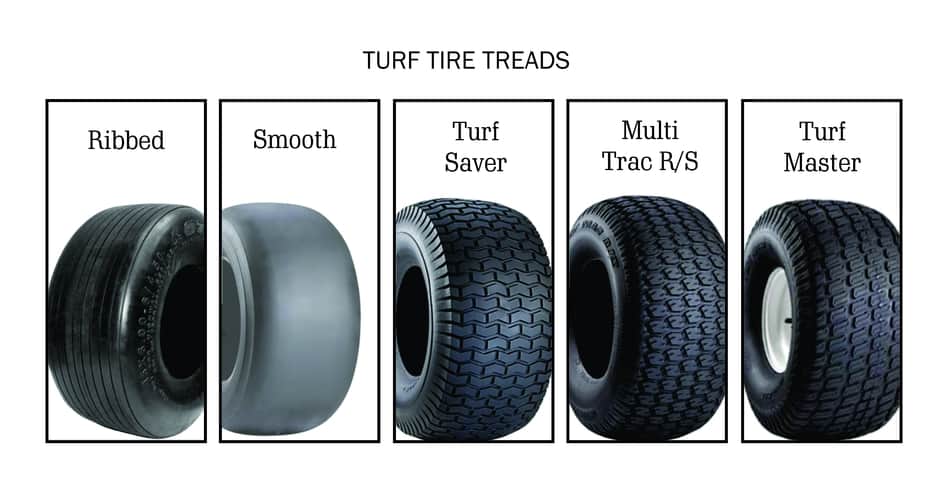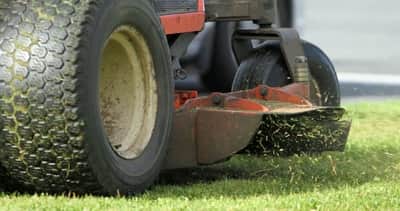There are so many different tires offered on lawn mowers today. With so many options out there it’s often difficult to know what tire is the best tire to mow your hillside. Let’s look at the reasons that determine the best mower tire for your lawn mower and lawn conditions.
When selecting the best tires for your zero-turn lawn mower manufacturers consider several factors:
- Whether your zero-turn is being used for commercial or residential applications
- Weight of your zero turn
- The type of traction your lawn mower will require
- The necessity for a low disturbance to the grass without leaving a rut or tracking up sensitive grass.
- Ability to float along sandy grounds
The best zero-turn tires for hills are 8-ply turf tires with a square sidewall allowing your mower to hold the hillside. These tires provide increased stability when the weight of the lawn mower is shifted while moving sideways on the hillside.
Read on to find out our tire recommendations along with more in-depth explanations on tires.

This post may include affiliate links. Purchases made through these links may provide a commission for us, at no extra cost to you. As an Amazon Associate, we earn from qualifying purchases.
Follow all safety instructions provided in your equipment operator’s manual prior to diagnosing, repairing, or operating.Consult a professional if you don’t have the skills, or knowledge or are not in the condition to perform the repair safely.
Hazards of Using Wrong Tires on Hills
The tires are responsible for keeping your zero-turn mower from sliding sideways down a hillside. Using the correct type of tire can keep the mower on the hill if the hill is not too steep.
Mowing on a hillside with a steep grade greater than 15 degrees can put you in an extremely dangerous situation. For more safety information about zero turns refer to, “Dangers of Zero Turn Mowers & How to Operate Safely.”
Mowers that use a tire that has a rounded type of sidewall cause a lawn mower to slide down the hill and tear up the grass when sliding down the hill.
Using the wrong tire on your zero-turn when mowing hills poses risks of your mower sliding and rolling over especially when mowing on too steep of a hill and/or in wet conditions.
Items to Consider When Buying Zero Turn Tires for Hills
The tire cost of a good tire is greater than a basic turf tire, but the increased stability that is offered with using the right tire outweighs the cost difference.
It is best to find a tire that can be lowered in air pressure to give you more floatation on the hill.
Tire Ply
An 8-ply tire is best for a zero-turn mowing hills. The 8-ply tire has a stiffer sidewall than a commonly offered 6-ply tire on lawn mowers. The stiffer sidewall will not flex as easily as the lighter tire ply options and will help with stability.
You can tell the side wall of a turf tire by looking at the side of the tire. You will not run an 8-ply tire on a car or truck because it will wear out quicker due to heat. On a mower, we are just looking for stability.
The wear from tire speed is something we don’t have to consider due to using it on a lawn mower.
Tire Width
The tire width of the turf tires matters when you are looking to get a lighter footprint from your lawn mower. When you look at larger zero turns you will notice they have a wider tire on them.
The wider tire is surely for flotation reasons and to provide an overall light ground pressure leaving a lighter footprint in the grass. A narrow tire will leave deep-rooted tracks in the grass with the weight on larger heavier zero turns.
The wider the tire, the lighter the footprint of your zero-turn which leaves less turf compaction.
Tire Tread
The tread pattern used on lawn mowers is known as turf tread. It is not a super aggressive tread that will tear up your lawn.
You will want to make sure your tires have a turf tread with a squared-off look on the side wall. Lawn care professionals run a turf tire with a long sideways s-tread or a dog bone tread.
Smaller zero turns use a zig-zag tread on them just to help on small inclines. This tread pattern is also known as a saw tooth tread.
If you look at the front caster wheels on a zero-turn, you will notice there is no tread on them. These are called smooth tires. They don’t require tread because they move fast and swivel around. If caster wheels had tread, they may tear up your grass.
You will also see a ribbed tire offered on the market. This is not a tire for lawn mowers. These tires are for applications where the tire does not need much tread and they are being used in a straight line.
For example, a wheelbarrow uses a ribbed tire with 3 or 4 lines on it. It does not need much tread because it goes in a straight line and the person behind it is doing all the work.

Best Tires for Your Zero Turn Lawn Mower
Here are three turf tires we have used and highly recommend for your zero-turn.
There are many other tire manufacturers to choose from. If you choose to purchase a different brand, you will need to inspect them as some use harder rubber. The harder the rubber on your lawn mower tires, the less traction you will have with them.
When the grass is dried up and the weeds still need to be cut, you will notice your tires slipping and tearing up the grass with hard rubber tires.
Commercial Zero Turn Mower Tires
Carlisle Turf Master Turf Tires
Carlisle Multi Trac C/S
Residential Zero Turn Mower Tires
Carlisle Turf Savers
Another Great Manufacturer Option for Zero Turn Turf Tires
Kenda Turf Tire
How to Keep Mower from Sliding on Hills
You can keep your lawn mower from sliding on hills by mowing when the grass is dry, using the correct tires, and utilizing weight kits.
Not only should you refrain from mowing a hill after the rain, but you also should not mow your hill in the early morning with dew on the ground. The damp grass can cause your tires to slip.
Utilizing a good turf tire with heavy square-like sidewalls and reducing tire air pressure will increase your ability to hold a hill.
If your tires are over three years old and you are using them more for personal use you might want to check the tread on them. Check them more often if you are using them more frequently.
Even if your tires look like they are in good condition they may not be in a good enough condition for your hills.
Pick up a tire tread gauge and measure the depth of your tread. You may be surprised at the amount of tread that has worn off and may need new tires. It’s best to be safe than put yourself in a dicey situation.
We explain more in, “Zero Turn Mowers: Are They Good on Hills.”
How Steep of a Hill Can You Mow with Your Zero Turn Mower?
You can use a zero-turn mower on a hill as steep as a 15-degree grade to prevent a rollover. Any hill that is steeper than this should be mowed using a different method.
Find out more about staying safe on your zero-turn lawn mower. “Dangers of Zero Turn Mowers & How to Operate Safely.”
What is the Best Way to Mow a Hill?
The best way to mow a hill is mowing on an angle. If you do need to mow from side-to-side it’s important to have tires that can maintain the stability of your lawn mower and make sure you are following zero-turn safety procedures to ensure you don’t roll your lawn mower.
Always mow in dry conditions and don’t overrun the hydraulics. It is natural to want to push the levers on your zero turn all the way forward when climbing a hill. Doing this will prematurely damage your pumps.
